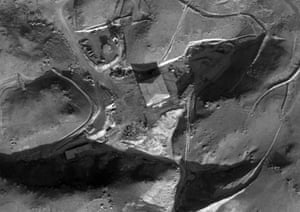Oliver Holmes
 Intelligence minister says attack is a ‘clear message’ to Iran it won’t allow its enemies to acquire nuclear weapons. Israel’s military has gone public for the first time to confirm a 2007 airstrike on a suspected Syrian nuclear reactor, announcing details of a night-time attack its intelligence minister said provides a clear warning to Iran. In a secret operation that has been extensively speculated on for a decade, Israelsaid it sent four F-16 fighters hundreds of miles into Syria on 6 September 2007, to bomb the partially completed al-Kubar facility near Deir ez-Zor.
Intelligence minister says attack is a ‘clear message’ to Iran it won’t allow its enemies to acquire nuclear weapons. Israel’s military has gone public for the first time to confirm a 2007 airstrike on a suspected Syrian nuclear reactor, announcing details of a night-time attack its intelligence minister said provides a clear warning to Iran. In a secret operation that has been extensively speculated on for a decade, Israelsaid it sent four F-16 fighters hundreds of miles into Syria on 6 September 2007, to bomb the partially completed al-Kubar facility near Deir ez-Zor.
Previously-classified footage, images and intelligence documents on the plan showed how Israel had monitored the site for several years and feared it could become operational within months.
One report, dated 30 March 2007, said: “Syria has set up, within its territory, a nuclear reactor for the production of plutonium, through North Korea, which according to an (initial) worst-case assessment is liable to be activated in approximately another year.”
The military said that following the four-hour operation, the reactor “had been totally disabled”, and the damage done “was irreversible”.

Trump will pull out of Iran nuclear deal, leading senator predicts
Black and white aerial images showed a box-like construction close to the Euphrates river in the desert, while video showed the structure exploding in a cloud of smoke following a countdown by a male voice.
The move to go public with the strike, which has already been widely reported and cited to US officials, comes amid repeated warnings by the Israeli prime minister, Benjamin Netanyahu, for the United States and others to take more robust action on Syria’s ally, Iran.
Netanyahu shares Donald Trump’s view that world powers need to scrap or rewrite the 2015 accord with Tehran that curbs its nuclear ambitions, as he believes it to be ineffective.
Israel’s intelligence minister, Yisrael Katz, made a direct warning to Iran in a tweet on Wednesday morning, saying the raid provided a clear message that Israel would not allow “nuclear weapons to countries like Iran who threaten its existence.”
The courageous decision of the Israeli government almost 11 years ago to destroy the nuclear reactor in Syria and the successful operation following it sends a clear message:
Israel will never allow nuclear weapons to countries like Iran who threaten its existence.
The defence minister, Avigdor Lieberman, stopped short of suggesting the possibility of a similar strike on Iranian facilities, but made clear the 2007 attack proved Israel was willing and able to act militarily.
“The motivation of our enemies has grown in recent years, but so too the might of the (Israel Defence Forces),” he said. “Everyone in the Middle East would do well to internalise this equation.”
Israel had acted before against the nuclear ambitions of its neighbours, notably in 1981 when it attacked a reactor under construction in Saddam Hussein’s Iraq.
Syria signed the 1970 nuclear non-proliferation treaty and had always denied the site was a reactor or that Damascus cooperated with North Korea to build nuclear weapons. At the time of the 2007 attack, Syria accused Israel of invading its airspace without providing further details.
Israel’s military sought to justify the strike on Wednesday further, noting that the Islamic State group captured the area around the facility during Syria’s civil war.
“The security implications of a nuclear reactor falling into the hands of Isis or other extremist groups during the war in Syria are vast,” it said.
Israel is not a signatory to the NPT and has long refused to confirm or deny reports by foreign governments that it holds nuclear weapons.
The military did not specify why it chose to go public with the material. As well as speculation that it was released as a warning to Iran, the move may be related to the upcoming memoir by Ehud Olmert, Israeli prime minister at the time, who ordered the strike.
As Iran becomes increasingly engaged in Syria’s seven-year conflict, Israel has grown distressed that its most potent foe has a military presence in a country with which it shares a border.
The Israeli air force has conducted well over 100 airstrikes in Syria, most believed to target suspected weapons shipments destined for the Iranian-backed Hezbollah militant group.
Last month, Israel downed a drone in its airspace that it claimed was Iranian, triggering a clash in which an Israeli jet was struck by Syrian anti-aircraft fire and “large-scale” strikes on targets near Damascus.
Since you’re here …
… we have a small favour to ask. More people are reading the Guardian than ever but advertising revenues across the media are falling fast. And unlike many news organisations, we haven’t put up a paywall – we want to keep our journalism as open as we can. So you can see why we need to ask for your help. The Guardian’s independent, investigative journalism takes a lot of time, money and hard work to produce. But we do it because we believe our perspective matters – because it might well be your perspective, too.
I appreciate there not being a paywall: it is more democratic for the media to be available for all and not a commodity to be purchased by a few. I’m happy to make a contribution so others with less means still have access to information.Thomasine, Sweden
If everyone who reads our reporting, who likes it, helps fund it, our future would be much more secure. For as little as £1, you can support the Guardian – and it only takes a minute. Thank you.
No comments:
Post a Comment